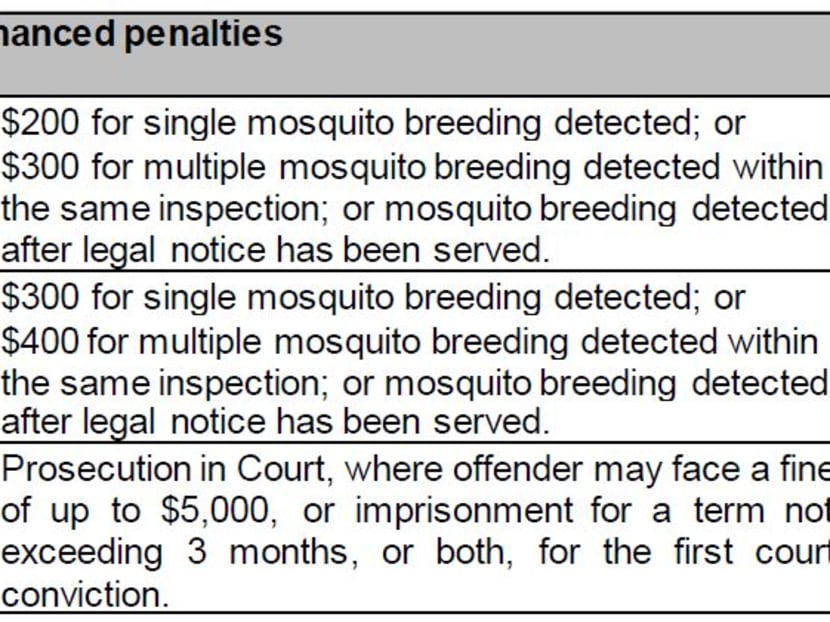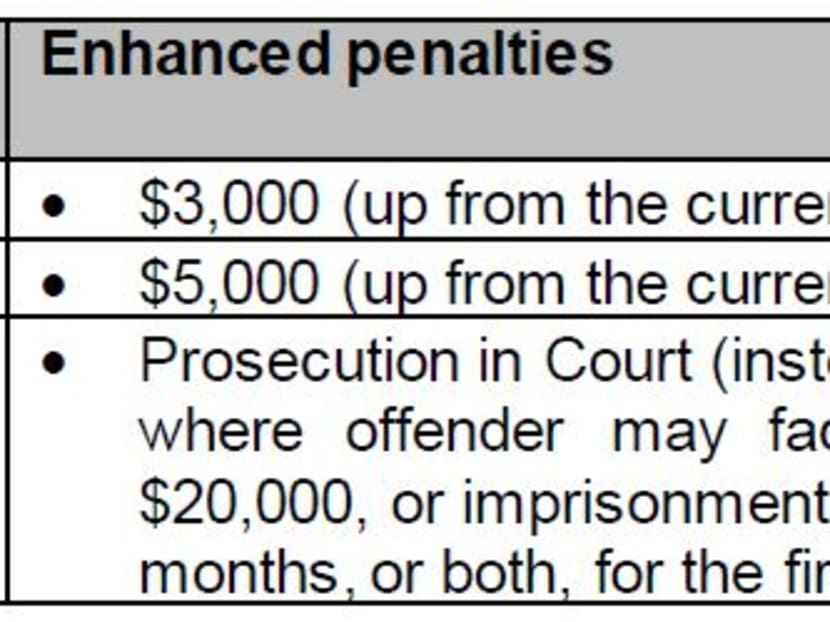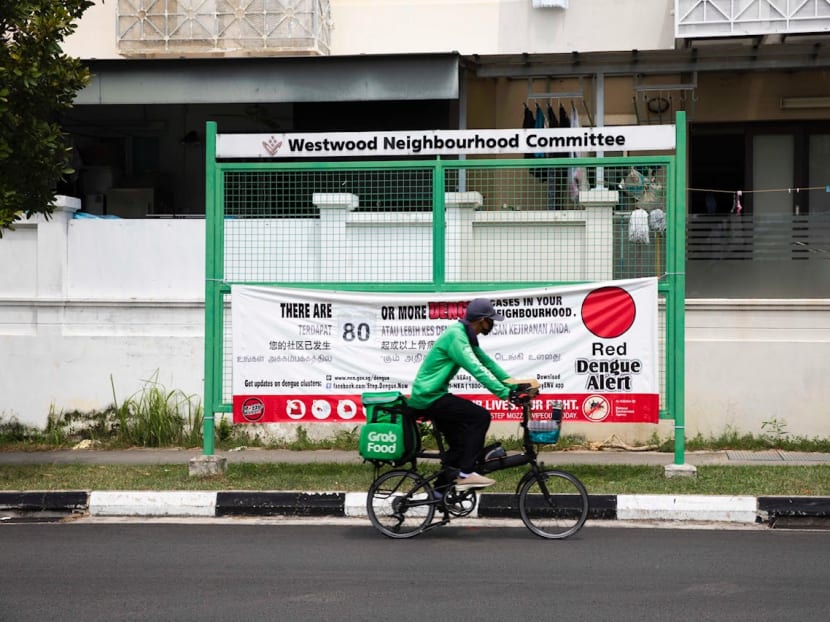Repeat mosquito-breeding offenders to face heavier penalties from July 15: NEA
SINGAPORE — Amid the worst dengue outbreak in Singapore since 2013, households found to be repeat violators of mosquito-breeding laws will soon face heavier penalties from the National Environment Agency (NEA).
- Tougher penalties come after a five-fold surge in Aedes larvae in homes
- 12,542 dengue cases reported so far this year, in the worst outbreak since 2013
- Five largest clusters: Woodleigh Close, Leicester Rd, Aljunied Rd, Tampines Ave 7, Chu Lin Rd
SINGAPORE — Amid the worst dengue outbreak in Singapore since 2013, households found to be repeat violators of mosquito-breeding laws will soon face heavier penalties from the National Environment Agency (NEA).
Those subject to the tougher regime to kick in from July 15 include anyone found to have multiple mosquito-breeding habitats in their homes during a single inspection. Residents where mosquito breeding is detected after getting a legal notice from NEA also face stiffer penalties.
In a statement on Monday (June 22), NEA cited a five-fold surge in the incidence of Aedes mosquito larvae detected in homes and common corridors during the two-month circuit breaker, compared with the two months prior.
“This is despite more people staying home and being in a position to upkeep their premises better, and comes after years of educational outreach on the prevention of mosquito-breeding habitats at home,” NEA said.
It also noted that the breeding incidence rate in homes has jumped by 50 per cent in the last three years compared with the preceding three years.
The heavier penalties being imposed from July 15 are in the “interest of public health and to protect every individual in the community”, the agency added.
WHAT ARE THE HEAVIER PENALTIES IMPOSED?
Right now, households are fined S$200 for mosquito breeding detected on their residential premises regardless of the number of breeding habitats found, NEA said.
Offenders are sent to court only for the fourth offence.
From July 15, in addition to the tougher penalties, repeat offenders could also be sent to court, NEA said.

NEA added that the financial penalty would also be increased for mosquito breeding detected at construction sites.
It noted that while there has been a steady reduction of mosquito-breeding habitats detected at construction sites, mosquito breeding is still found at these sites.

From July 15, NEA said that it would also tighten its enforcement measures over town councils in relation to mosquito breeding found in common breeding habitats.
The tougher penalties are in addition to existing penalties against mosquito breeding found in common habitats, such as on rooftops, in water tanks and discarded receptacles, NEA said.
At present, NEA said that town councils may be fined up to S$5,000 for mosquito breeding detected in dengue cluster areas.
In a statement, Mr Masagos Zulkifli, Minister for the Environment and Water Resources, said that immediate action by everyone is required as “the majority of mosquito breeding is found in residential homes”.
“Even as NEA continues to conduct home inspections and educate residents on what they can do to protect themselves and to prevent mosquito breeding at home, the number of dengue cases has continued to rise,” said Mr Masagos.
He added: “This places about 325,000 households living in over 200 dengue clusters islandwide at higher risk of dengue transmission. We will tighten enforcement and increase penalties for mosquito-breeding offences, including for recalcitrant offenders, to serve as a strong deterrent.”
DENGUE CASES CONTINUE TO SPIKE
In its statement, NEA said 12,542 cases of dengue have been reported in Singapore so far this year as of Monday.
The number of weekly dengue cases also exceeded 1,000 in the week ending June 13, NEA added.
“This is the highest number for the same period of the year since 2013, the largest outbreak year recorded in Singapore’s history,” NEA said.
It added that as of June 19, 254 active dengue clusters had been reported.
“The five largest dengue clusters are located at Woodleigh Close, Leicester Road, Aljunied Road, Tampines Avenue 7, and Chu Lin Road,” NEA said.
NEA added that it has been working with key stakeholders to conduct intensive vector-control operations in dengue cluster areas.
With the cooperation of members of the Inter-Agency Dengue Taskforce (IADTF) and general community, NEA said it has closed about 78 per cent of the dengue clusters reported since the start of this year.
Even so, NEA said that repeated mosquito breeding is still being detected on residential premises in the Woodleigh Close and Aljunied Road dengue clusters.
“There are also premises with multiple mosquito breeding detected in common breeding habitats, such as pails, dish trays, containers and flower pot plates, despite NEA’s constant reminders in our outreach materials to check these common habitats,” NEA said.
The agency said it is important for members of the public to take proactive action to protect themselves and their loved ones.
“By removing mosquito-breeding habitats quickly, we are able to break disease transmission earlier,” NEA said.
WHAT NEA IS DOING TO COMBAT DENGUE
NEA said that dengue is endemic in Singapore and the population’s immunity to dengue is low as a result of successful mosquito and dengue control efforts in recent decades.
It added that there are three main components in the transmission of dengue: The dengue virus, the Aedes mosquito, and the human host.
“Removing any one of these components will halt the spread of dengue,” NEA said.
It added that vector control is a key strategy, given that Singapore’s population will continue to have low immunity and that “we have limited control over other factors like warmer weather, which is conducive for the faster multiplication of the Aedes mosquito and dengue virus”.
NEA had previously introduced a “multi-pronged approach” to combat the virus.
Between January and May this year, NEA said that it had conducted more than 351,000 inspections islandwide, including 3,100 checks at construction sites, and uncovered about 8,600 mosquito-breeding habitats.
During the same period, more than 1,200 enforcement actions were taken against owners of premises for mosquito breeding. Seventy-three summonses and two stop-work orders were also issued at construction sites, and four contractors will be charged in court over repeat offences, NEA said.
Over the same period, NEA said that it has also issued about 6,200 legal notices to homeowners or occupiers to make their premises available for inspection and vector control.
“If NEA officers are unable to access the premises and where urgent vector control is necessary, a legal notice under the Control of Vectors and Pesticides Act will be served to the occupiers, requiring them to open up their homes for inspection at a specified date and time,” NEA said.
In cases where premises continue to remain inaccessible or are vacant, NEA said that it may need to gain entry by force after serving the legal notices to ensure that any mosquito-breeding habitats are quickly found and destroyed.
WHAT THE PUBLIC CAN DO
NEA said that its Gravitrap surveillance system, which monitors the Aedes mosquito population in residential areas, detected a 20 per cent increase in the Aedes aegypti mosquito population in May, compared with April.
“As we have now entered the warmer months of the year, we anticipate an increase in the Aedes aegypti mosquito population, unless every individual urgently steps up now to prevent mosquito breeding, by removing stagnant water in their environment,” NEA said.
NEA urges all residents living in the dengue cluster areas to cooperate with its officers and facilitate their checks and indoor misting in their homes.
“Allowing NEA to access all homes in dengue cluster areas as quickly as possible helps keep your family members, neighbours and the community safe from being infected with dengue,” said NEA.
Members of the public are also encouraged to take steps such as using aerosol insecticide spray and mosquito repellent to protect themselves and their families.
NEA said that the latest updates on the dengue situation can be found on its website, the Stop Dengue Now Facebook page, and the myENV mobile application.









